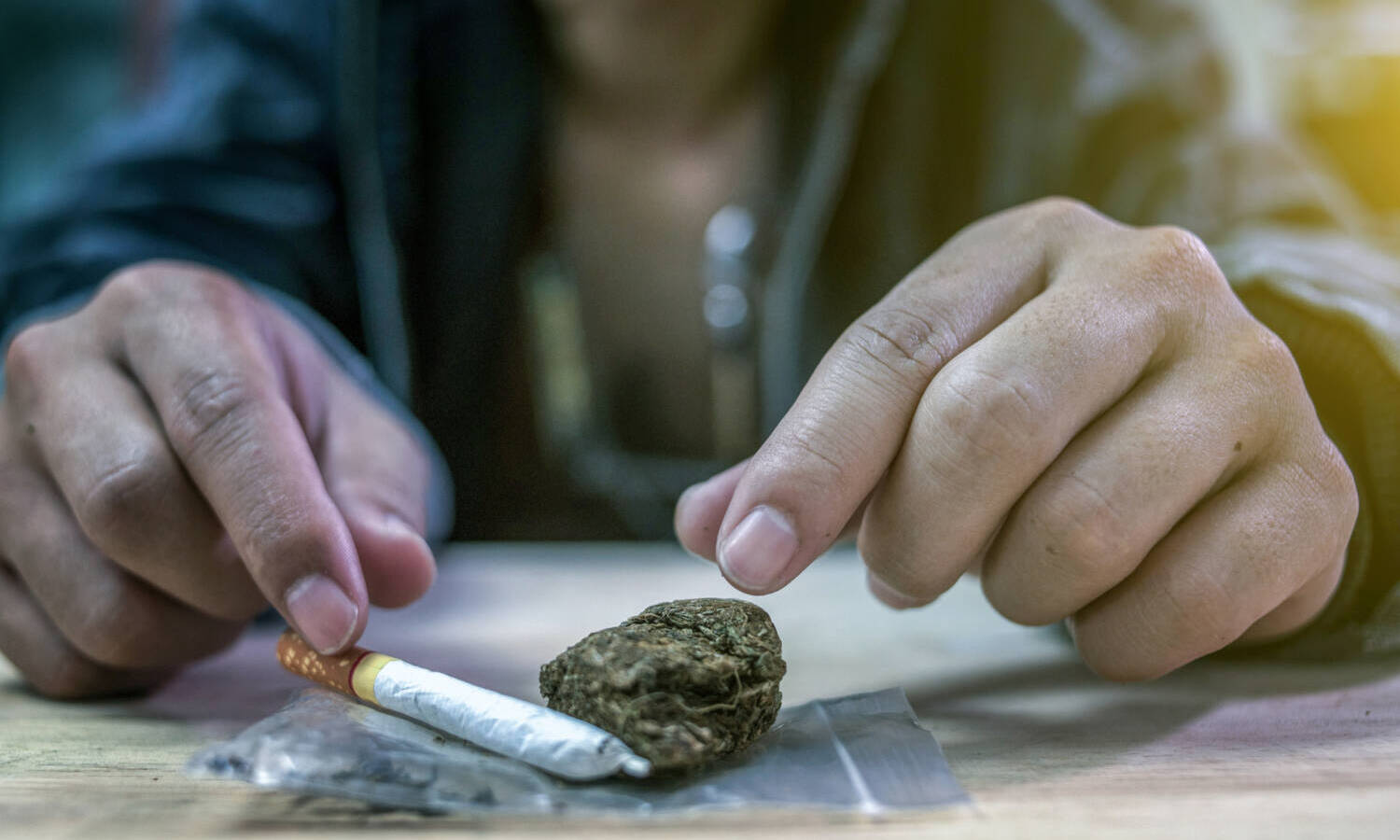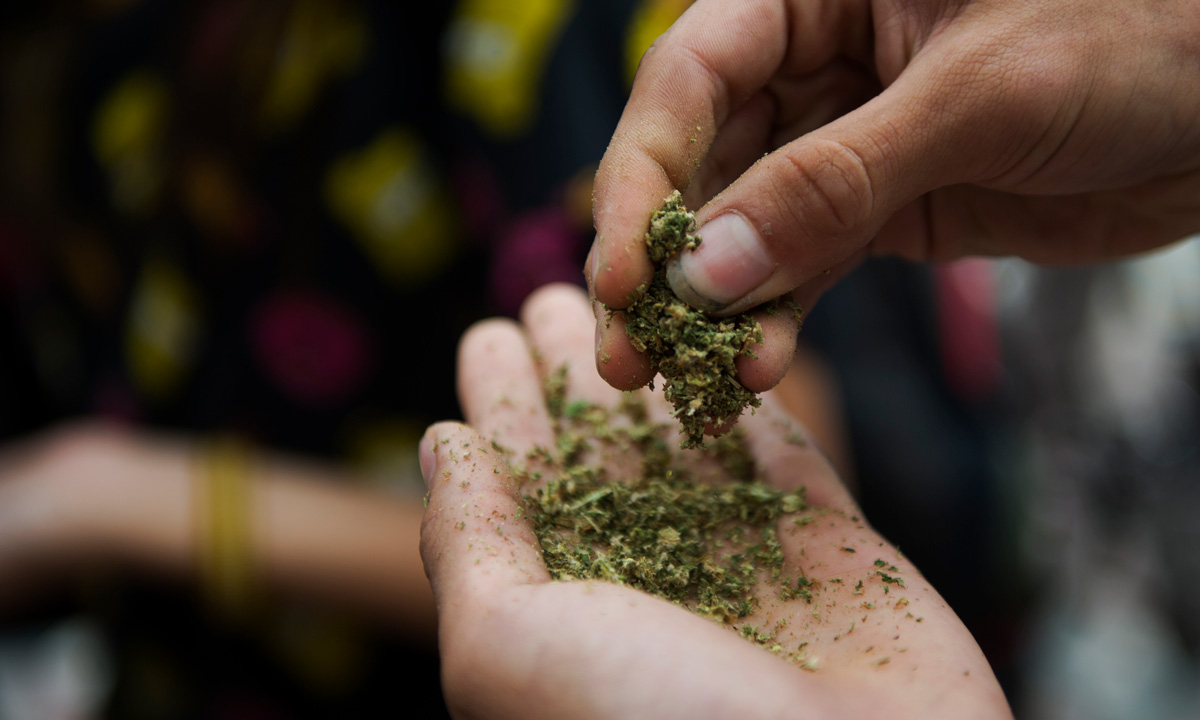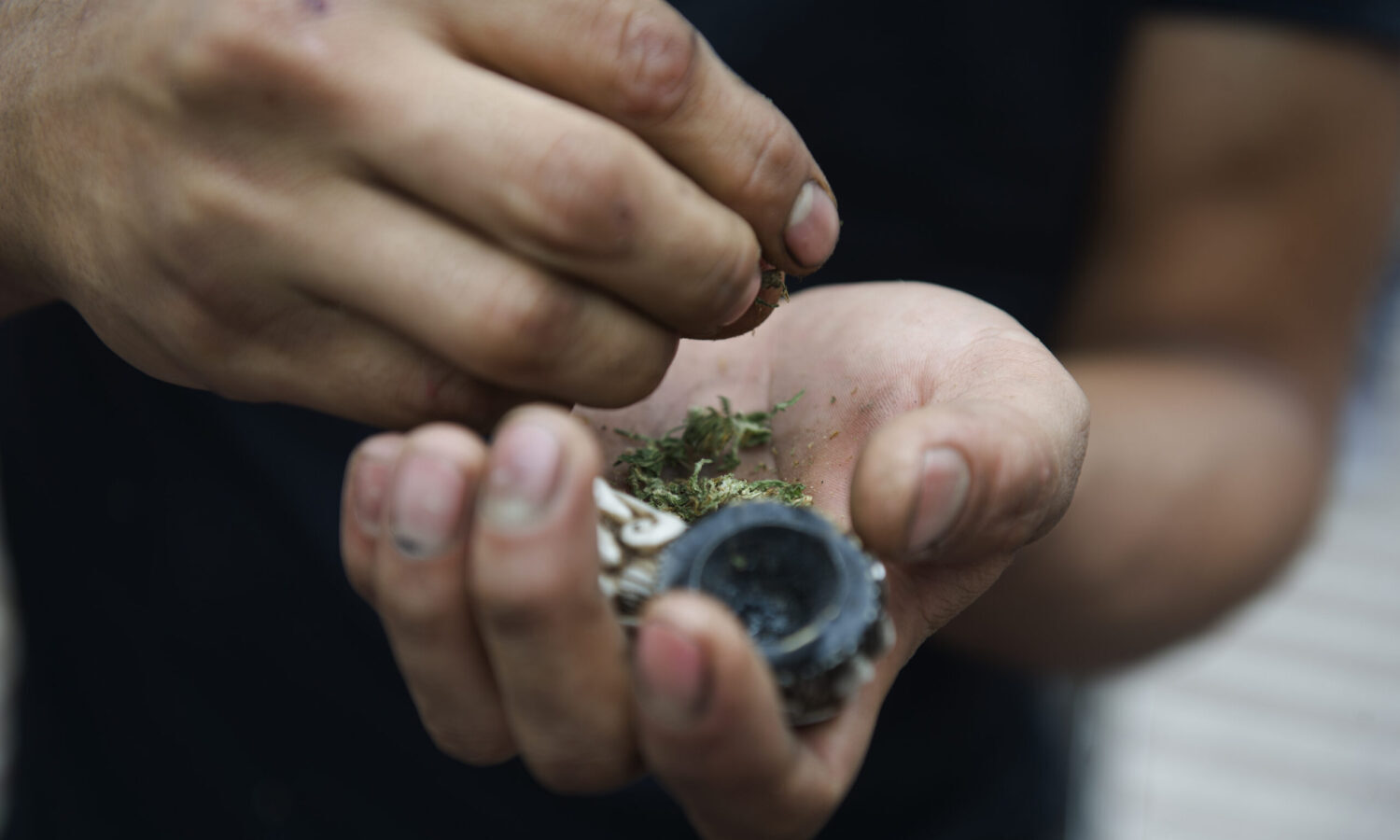Government
Study: Dangerous Synthetic Cannabinoids Poisonings Are Less Common In Legal Cannabis States

Illegal synthetic cannabis known under many street names such as Ak-47, K2, Spice, Scoobie Snacks, Mr. Nice Guy and 24-Karat Dream is less commonly used in states that have legal marijuana programs, a Washington State University-led study recently confirmed.
The research published in the Journal of Clinical Toxicology revealed a 37% drop in poisoning reports from illicit synthetic cannabinoids in these states with legal recreational cannabis use, writes Medical Express.
“This study shows some potential public health benefits to the legalization and regulation of adult use of cannabis,” said study lead author Tracy Klein, a WSU associate professor of nursing. “Based on both past research and this current study, it’s evident that users who have a choice to use a less toxic product would potentially do so.”

What Are Synthetic Cannabinoids?
It is important to distinguish between synthetic cannabinoids and the actual marijuana plant, as they are far from the same thing. The name is crafted based on the fact that these synthetic drugs are made of molecules that bind to the same receptors to which cannabinoids such as THC, CBD, and others, actually found in the cannabis plant also attach.
Basically, they are designed to be similar to THC, but often these synthetic analogs have stronger binding affinity and greater potency to the CB1 receptors, which makes them toxic. They are known to cause severe impairment and even death.
According to data from the Centers for Disease Control and Prevention, a 17-year-old boy “suffered a cardiac arrest after reportedly taking a single “hit” of K2/Spice.”
Study Highlights
The researchers analyzed data from the National Poison Data Data System from 2016 to 2019, before the COVID outbreak. They categorized the states into three categories: 1) permissive — allowing both medical and adult use 2) medical — allowing only medical use and 3) restrictive — banning almost all marijuana use.
In the sample that was assessed, there were 7,600 poisoning reports associated with synthetic cannabinoid use, out of which, as much as 65% required medical assistance. There were also 61 deaths.
More than half of these positioning report calls (56) happened in a state with restrictive marijuana policies, the study revealed. Some 38.6% happened in states with medical cannabis programs, and just 5.5% happened in states with legal recreational cannabis use.
Klein further highlighted that future research is needed to identify the use of these drugs and the differences between them. The study doesn’t focus on synthetically derived delta-8, for example.
“We know that there are many cannabinoids being developed and on the market—and the regulators are struggling to catch up,” said Klein.
Co-authors of the study count Janessa Graves from WSU College of Nursing, Julie Dilley of the Multnomah County Health Department and Oregon Healthy Authority, and Dr. Erica Liebelt of the University of Arkansas College of Medicine.

Why Would Anyone Take Synthetic Marijuana?
There are in fact a few synthetic cannabinoids made solely for medical use, such as dronabinol and nabilone. Dronabinol was approved in 1985 by the FDA as Marinol for the treatment of AIDS-related anorexia and later for the treatment of chemotherapy-induced nausea and vomiting. Nabilone is also created and used to treat severe nausea and vomiting caused by cancer drug treatment.
Other illegal synthetic cannabinoids, like K2 or Ak-47, have no medical purposes. So, why would anyone use them?
RELATED: The Danger Of Synthetic Cannabinoids
“These products are made in a powdered format and could be sprayed on or added to something that looks exactly like natural cannabis. So, in a party situation, I could see that someone could use this unintentionally,” said Klein, as reported by CNN Health.
Another problem is testing for these drugs.
“You can’t easily test for illicit cannabinoids. A lot of times, we only find out if a patient has been using them because they’re hospitalized or because they’re dead,” Klein said.
According to CDC, another reason some people turn to synthetic cannabinoids is to avoid a positive result on drug screening conducted as “a condition of employment, in substance abuse treatment programs, or in the criminal justice system.”
Business
New Mexico cannabis operator fined, loses license for alleged BioTrack fraud

New Mexico regulators fined a cannabis operator nearly $300,000 and revoked its license after the company allegedly created fake reports in the state’s traceability software.
The New Mexico Cannabis Control Division (CCD) accused marijuana manufacturer and retailer Golden Roots of 11 violations, according to Albuquerque Business First.
Golden Roots operates the The Cannabis Revolution Dispensary.
The majority of the violations are related to the Albuquerque company’s improper use of BioTrack, which has been New Mexico’s track-and-trace vendor since 2015.
The CCD alleges Golden Roots reported marijuana production only two months after it had received its vertically integrated license, according to Albuquerque Business First.
Because cannabis takes longer than two months to be cultivated, the CCD was suspicious of the report.
After inspecting the company’s premises, the CCD alleged Golden Roots reported cultivation, transportation and sales in BioTrack but wasn’t able to provide officers who inspected the site evidence that the operator was cultivating cannabis.
In April, the CCD revoked Golden Roots’ license and issued a $10,000 fine, according to the news outlet.
The company requested a hearing, which the regulator scheduled for Sept. 1.
At the hearing, the CCD testified that the company’s dried-cannabis weights in BioTrack were suspicious because they didn’t seem to accurately reflect how much weight marijuana loses as it dries.
Company employees also poorly accounted for why they were making adjustments in the system of up to 24 pounds of cannabis, making comments such as “bad” or “mistake” in the software, Albuquerque Business First reported.
Golden Roots was fined $298,972.05 – the amount regulators allege the company made selling products that weren’t properly accounted for in BioTrack.
The CCD has been cracking down on cannabis operators accused of selling products procured from out-of-state or not grown legally:
- Regulators alleged in August that Albuquerque dispensary Sawmill Sweet Leaf sold out-of-state products and didn’t have a license for extraction.
- Paradise Exotics Distro lost its license in July after regulators alleged the company sold products made in California.
Golden Roots was the first alleged rulebreaker in New Mexico to be asked to pay a large fine.
Source: https://mjbizdaily.com/new-mexico-cannabis-operator-fined-loses-license-for-alleged-biotrack-fraud/
Business
Marijuana companies suing US attorney general in federal prohibition challenge

Four marijuana companies, including a multistate operator, have filed a lawsuit against U.S. Attorney General Merrick Garland in which they allege the federal MJ prohibition under the Controlled Substances Act is no longer constitutional.
According to the complaint, filed Thursday in U.S. District Court in Massachusetts, retailer Canna Provisions, Treevit delivery service CEO Gyasi Sellers, cultivator Wiseacre Farm and MSO Verano Holdings Corp. are all harmed by “the federal government’s unconstitutional ban on cultivating, manufacturing, distributing, or possessing intrastate marijuana.”
Verano is headquartered in Chicago but has operations in Massachusetts; the other three operators are based in Massachusetts.
The lawsuit seeks a ruling that the “Controlled Substances Act is unconstitutional as applied to the intrastate cultivation, manufacture, possession, and distribution of marijuana pursuant to state law.”
The companies want the case to go before the U.S. Supreme Court.
They hired prominent law firm Boies Schiller Flexner to represent them.
The New York-based firm’s principal is David Boies, whose former clients include Microsoft, former presidential candidate Al Gore and Elizabeth Holmes’ disgraced startup Theranos.
Similar challenges to the federal Controlled Substances Act (CSA) have failed.
One such challenge led to a landmark Supreme Court decision in 2005.
In Gonzalez vs. Raich, the highest court in the United States ruled in a 6-3 decision that the commerce clause of the U.S. Constitution gave Congress the power to outlaw marijuana federally, even though state laws allow the cultivation and sale of cannabis.
In the 18 years since that ruling, 23 states and the District of Columbia have legalized adult-use marijuana and the federal government has allowed a multibillion-dollar cannabis industry to thrive.
Since both Congress and the U.S. Department of Justice, currently headed by Garland, have declined to intervene in state-licensed marijuana markets, the key facts that led to the Supreme Court’s 2005 ruling “no longer apply,” Boies said in a statement Thursday.
“The Supreme Court has since made clear that the federal government lacks the authority to regulate purely intrastate commerce,” Boies said.
“Moreover, the facts on which those precedents are based are no longer true.”
Verano President Darren Weiss said in a statement the company is “prepared to bring this case all the way to the Supreme Court in order to align federal law with how Congress has acted for years.”
While the Biden administration’s push to reschedule marijuana would help solve marijuana operators’ federal tax woes, neither rescheduling nor modest Congressional reforms such as the SAFER Banking Act “solve the fundamental issue,” Weiss added.
“The application of the CSA to lawful state-run cannabis business is an unconstitutional overreach on state sovereignty that has led to decades of harm, failed businesses, lost jobs, and unsafe working conditions.”
Business
Alabama to make another attempt Dec. 1 to award medical cannabis licenses

Alabama regulators are targeting Dec. 1 to award the first batch of medical cannabis business licenses after the agency’s first two attempts were scrapped because of scoring errors and litigation.
The first licenses will be awarded to individual cultivators, delivery providers, processors, dispensaries and state testing labs, according to the Alabama Medical Cannabis Commission (AMCC).
Then, on Dec. 12, the AMCC will award licenses for vertically integrated operations, a designation set primarily for multistate operators.
Licenses are expected to be handed out 28 days after they have been awarded, so MMJ production could begin in early January, according to the Alabama Daily News.
That means MMJ products could be available for patients around early March, an AMCC spokesperson told the media outlet.
Regulators initially awarded 21 business licenses in June, only to void them after applicants alleged inconsistencies with how the applications were scored.
Then, in August, the state awarded 24 different licenses – 19 went to June recipients – only to reverse themselves again and scratch those licenses after spurned applicants filed lawsuits.
A state judge dismissed a lawsuit filed by Chicago-based MSO Verano Holdings Corp., but another lawsuit is pending.
Source: https://mjbizdaily.com/alabama-plans-to-award-medical-cannabis-licenses-dec-1/
-

 Business2 years ago
Business2 years agoPot Odor Does Not Justify Probable Cause for Vehicle Searches, Minnesota Court Affirms
-

 Business2 years ago
Business2 years agoNew Mexico cannabis operator fined, loses license for alleged BioTrack fraud
-

 Business2 years ago
Business2 years agoAlabama to make another attempt Dec. 1 to award medical cannabis licenses
-

 Business2 years ago
Business2 years agoWashington State Pays Out $9.4 Million in Refunds Relating to Drug Convictions
-

 Business2 years ago
Business2 years agoMarijuana companies suing US attorney general in federal prohibition challenge
-

 Business2 years ago
Business2 years agoLegal Marijuana Handed A Nothing Burger From NY State
-

 Business2 years ago
Business2 years agoCan Cannabis Help Seasonal Depression
-

 Blogs2 years ago
Blogs2 years agoCannabis Art Is Flourishing On Etsy



